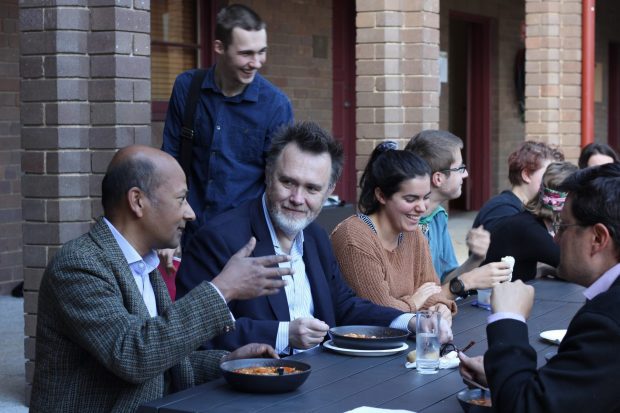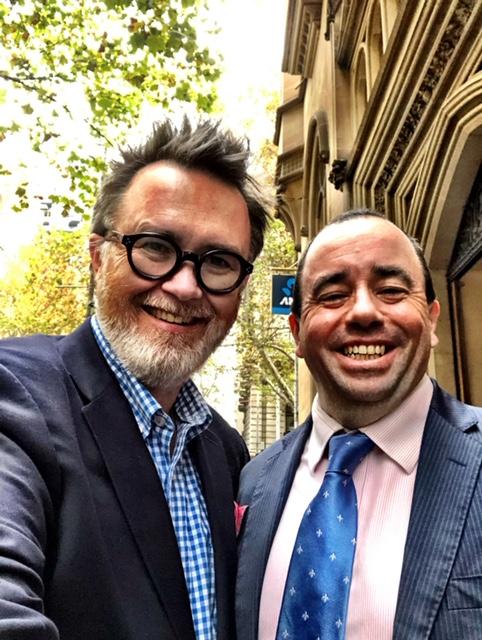The Sunlit World Down Under

Well, that was one long sleep. Got home last evening, went to bed at nine, woke up at six this morning thinking, “Hey, no jet lag!” Then went to lie down again to take the edge off … and woke up at half past noon.
The journey to Australia will take a lot out of a soft middle-aged man. But a journey to Australia will give far, far more than it extracts, though. I find myself almost drunk with gratitude for this past week. As ever, the best thing about these Benedict Option-related travels is the people you meet. I’m sure that a lot of different things will be coming out over the next few days on this blog as I recall the things I did and the people I met. I tried to keep up somewhat with it here while I was abroad, but my days were very full. I can say, though, that I’ve grown up in a culture that regarded Australians as cheerful, straightforward and friendly. Every Aussie I’ve ever met was exactly that. And now that I’ve been there, well, it’s true. You don’t meet a stranger in Australia. I know that I had a selective experience, and I know also from reading the poetry of the great Australian Les Murray that there are less savory aspects of the Australian character. I’ve also discovered from this journey — from the seismic political events there last weekend, and in learning more about Cardinal George Pell’s unjust conviction — that the same vitriol and spite one sees among certain progressive elites in the US also exists in spades in Australia.
But my experience of the country and its people was something close to exhilarating. I mean that. As I told someone at dinner the other night, I spend most of my days in front of my laptop, monitoring the decline and fall of Western civilization, and thinking hard about it. And then I go out into the world and meet people like the Slovak Catholics I was with earlier this month, and like the Aussies who took such good care of me this past week, and I realize that, in Russell Kirk’s phrase, “the world remains sunlit despite its vices.”
It really is beyond my powers to articulate how much hope and inspiration I take from being with ordinary Christians who see things more or less as I do, but who persist in joy and hope, through the fog. I found many Catholics to be somewhat demoralized, in part because of the rising tide of anti-Christianity in their country, and in part because of the shocking way Cardinal Pell has been scapegoated. But I also found them to be hopeful, and not in a sentimental way. I sat next to Archbishop Anthony Fisher of Sydney at dinner last week, and though it would be rude to repeat what we talked about, let me assure you that he is utterly undeceived about the grave challenges the Church faces, both externally and internally, and that he struck me as a good man doing his best to rise to those challenges.
For me, though, one great cause for Christian hope in Australia is Campion College. It’s a small Sydney institution that’s the country’s first liberal arts college. It’s a Catholic Great Books school on the St. John’s model. Go to the website and look at the course outline. What an astonishing place! Though my family is not Catholic, we are traditional Christians who are deeply committed to the Western tradition. Besides, my children have also benefited from a classical Christian education in elementary and high school, and their mother and I have seen how this countercultural form of learning forms their hearts as well as their minds. If we were Australian, we would eagerly and gratefully send our children to college at Campion. It wouldn’t even be a second thought.
I strongly encourage my Australian readers — Catholic and other tradition-minded Christians — to go visit Campion, and meet with professors and students. The maturity of these young adults, and their intellectual sharpness, is striking. We hear a lot of complaining these days about the deficits and weaknesses of this student generation — how entitled they are, and how snowflakey (that is, unable to deal with ideas that distress them). Not at Campion. Those undergraduates are confident, intelligent, and engaging and — dare I say it? — joyful. I came away thinking that Campion is to 21st century Australia what the early Benedictine monasteries were to Dark Ages Europe: a stronghold of faith, learning, and formation that is a light in the darkness, an outpost of civilization, and a blessing to all touched by the prayer and work of its people.
If Christianity is going to survive in the West, it is going to need educational institutions like Campion College. I’m not exaggerating. The crisis is just that serious. All Christians in Australia — not only Catholics — who care about the faith and the intellectual, artistic, and cultural patrimony of the West should rally to Campion College. The Christian future depends on institutions like Campion College more than many of us know. Pray for Campion. Send your college-age children to study there (they accept international students too). Support it with your donations, as it receives no money from the state. Campion is not a monastery, to be sure, but a Christian institution that forms young minds for life in and service to the world. Nevertheless, I think of it in the same words St. Benedict, in his Rule, used to describe the monastery: “a school for the Lord’s service.”
When I was in Australia, I told audiences about the Tipi Loschi, the astonishing community of lay Catholics living in a small city on the Adriatic, and living out their Christian faith in joyful community. The Tipi Loschi show what all of us Christians can accomplish with faith, love, and a dedication to being creative minorities in a post-Christian culture. Well, so does the Campion College community. As I told Aussies about the Tipi Loschi, “They’re all traditional, conservative Catholics — but they’re not angry about it.” That’s because they’re Chestertonians in love with the romance of orthodoxy.
I got the same feeling with the Campion crowd. The senior leadership of institutions like this sets the tone. A small, religiously-oriented school like this could be a place of rigidity, characterized by a siege mentality. That’s not Campion, not at all. Dr. Paul Morrissey, the theologian who is the college’s president, gave the past week to traveling with me up and down Australia’s East Coast. He hosted me for dinner twice in his family home — he and his wife have a big family of delightful children — and was a wonderful travel companion. The generosity of this man’s spirit made a tremendous impression on me, and made me confident that the young people entrusted to the care of him and his team are led by men and women who don’t just talk the Christian talk, but who walk the Christian walk. In a world like ours, that is a blessing beyond price.
